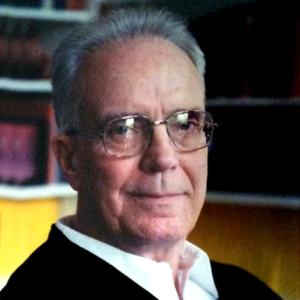Edward L. Ericson: A Lifetime of Humanist Service
 Edward L. Ericson
Edward L. Ericson The American Ethical Union will honor Edward L. Ericson with the Felix Adler Lifetime Achievement Award at our 104th Assembly this June. While the award recognizes Ericson’s dedication to growing the Ethical Culture Movement, he is also highly influential in the broader humanist movement through his writings, lobbying, and collaboration with other leaders. Throughout his life, Ericson has been a champion of civil rights, the naturalist philosophy, and taking responsibility for creating a better future for the generations who follow.
Ericson has been a member of the American Humanist Association (AHA) for seventy years and is still finding new and creative ways to promote nontheistic humanist thinking. He got his start as a college student in 1949, and with encouragement from the AHA’s executive director at the time, Dr. Edwin Wilson, he attended the Star King School for the Ministry. After graduation he served Unitarian congregations for several years before joining the Ethical Culture Movement, where he served as leader for the Washington and New York Ethical Societies for twenty-five years—and was president of the American Ethical Union—before retiring to write full-time.
In 1973 Ericson was a signer of the Humanist Manifesto II and in 2003 signed on to “Humanism and its Aspirations,” the third iteration of the Humanist Manifesto. In 1981 he started the Center for Moral Democracy, which soon became Americans for Religious Liberty, and he briefly was a guest faculty member of The Humanist Institute, which is now the AHA Center for Education. Ericson is the author of several books, including American Freedom and the Radical Right (1982), The Free Mind Through the Ages (1985), The Humanist Way (1988), and The American Dream Renewed: The Making of a World People (1991).
Ericson met civil rights challenges soon after accepting the leadership role at the Washington Ethical Society (WES). It was the early 1960s and WES was building their new meetinghouse. At the time, the local construction unions were segregated and refused to open up apprentice opportunities to African Americans. After trying unsuccessfully to negotiate this issue, Ericson supported the Ethical Society’s decision to use non-union contractors who were willing to employ African American construction workers.
When the unions threatened to picket, the Society responded by erecting a large sign at the construction site that read, “Equal Opportunity Employer.” The threatened picketing did not occur. Leader Ericson, a union supporter his entire life, said this was the only time he went with non-union labor because “we were damned and determined we weren’t going to support segregation.”
Ericson spoke before numerous hearings of US Senate and congressional committees in support of amending selective service laws to eliminate discrimination against nontheists who applied to be conscientious objectors. He also testified in support of restricting prayer in public schools.
Ericson’s writings and talks approach naturalistic philosophy with eloquence. He views human life as “the outcome of an incalculably dynamic natural universe in its ongoing evolutionary progression” and sees no need to assume a supernatural intelligence presiding over the origin and destiny of life or the cosmos. He sees living his humanist values as a strenuous and ongoing process that animates our lives through the relationships we forge and nurture and “with whom we share life’s challenges and tragedies, its pleasures and rewards.”
Currently retired and living in Florida, Ericson has remained active as a speaker and enjoys the opportunity to share his thoughts about humanism, civic life, and ethics. A few years ago he articulated a call to action that is especially relevant today and a good example of his clear and articulate way of breathing life into humanist thought and practice:
Think of how the world would change if compassion were recognized as the basis of ethics—that that same lump in the throat that leads others to supernatural beliefs can just as easily shift to a naturalist focus.
Think of how a recognition that respect for the worth and dignity of others, especially those unlike ourselves, would lessen the likelihood that we might want to maim, kill, or slaughter them—singly or in large numbers as is happening today.
Think of how a universal sense of justice—a shift away from good and evil to less incendiary considerations of right and wrong—think of how that might decompress the anger and hostility that seems to drive so much of our culture today.
And imagine what a shared sense of social responsibility would do for our beleaguered nation and world.
These are reasoned things that reach across the divide of faith, that span our differences and touch everyone. These are things worth working for; these are things worth sacrificing for.
Edward L. Ericson will receive the Felix Adler Lifetime Achievement Award at the American Ethical Union 2019 Assembly on Saturday, June 22, 2019, in Tampa, Florida. All are welcome to join us in honoring his many years of service to humanism and hearing his thoughts on its future.
